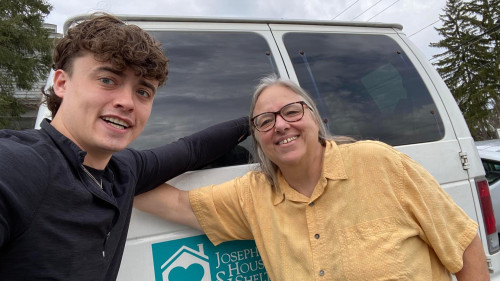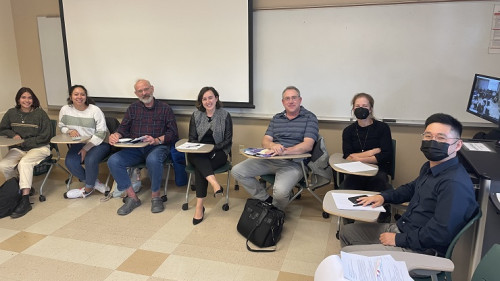
Humans and horses have always had a very special bond. These majestic animals have served us as transportation, athletes, workmates and friends. A new class is now offered at Siena that combines classroom and barn time to explore these relationships in depth.
Horse-Human Interaction was first offered last semester as one of Siena’s one-credit Life Skills courses, and is being taught again this spring. It is co-led by Elisa Martin, Ph.D., associate professor and department chair of social work, and Catherine “Cat” Lynch Capowski, adjunct professor and social work board member. Both pooled their considerable riding and equine care experience to develop the course. Martin holds a degree in stable and farm management in addition to her social work degrees, while Capowski is certified in equine therapy through the Professional Association of Therapeutic Horsemanship International.
“The course is very much in tune with Franciscan values of contemplation, and respect for animals and the environment,” said Martin. “Developing a connection with horses also teaches us to be our authentic selves, and to be fully in our bodies as well as to be present emotionally.”
She explained that a horse-human connection can help us develop “authentic communication” by being aware of our moods, because horses can sense what humans are experiencing emotionally.
“There is a need to be mindful when we’re with horses. They can sense if we are happy, nervous or scared.”
Of the seven students in the class, six had varying levels of equine experience, and one was a total horse newbie. During the semester they developed their knowledge of the horse-human connection, including horse communication though social behavior and handling. They also explored their spiritual connection to horses and how this impacts their “honorable communication” with them.
Discussions in the classroom were supplemented by field trips to Little Brook Farm in Old Chatham, one of the oldest horse rescue operations in the country. After learning about horse safety and herd behavior on campus, they got some hands-on time at the barn, grooming horses and leading them as a way to interact. They also practiced mindfulness activities such as guided breathing, noticing how their nervous system is impacted by a horse’s presence – and vice versa.
“Our energy is part of their experience,” said Capowski.
Kiara Éléna Pierristil '25 was the sole horse newbie in the class. She said being around the horses helped her learn how to breathe and how to take a second to be mindful of herself and others.
“I think mindfulness is something a lot of people struggle with, and the horses made it easier for me to get to that state,” she explained. “I encourage others to take this class because it carves out a time for self-care in your schedule, and gives you the opportunity to learn new things about an amazing animal and yourself in a safe environment.”
Ava Trimarchi ‘24 grew up with horses at her grandparents’ farm, so she wasted no time in registering for the class. She said it was “incredibly relaxing” getting to spend time with the horses at Little Brook.
“It’s a very informative class,” she said. “Although I went in with experience on horses, something new and meaningful I learned was creating a bond with multiple different horses for hours at a time. There is nothing more special than a bond that can be built up between a person and a horse.”
Siena equestrian team members Olivia Witkowski ’25 and Mary Peartree ’25 are horse veterans as well, but said the class still improved their equine skills.
“Horseback riding is the only sport where you have an athlete that can't speak your language, so you have to have the right mindset to be the best rider and show up for your horse physically and mentally,” said Witkowski. “The class made me more mindful of my partnership with the horse I’m riding, whether it's in practice or at a show. I tend to be a nervous rider, but in order for us to have a smooth ride, I need to be calm and confident so my signals are clear and we have a better chance at succeeding.”
She said riders sometimes call horses “big dogs” for their varying personalities and the close relationship they form with humans.
“Horses are the most beautiful and complex animals I have ever come across, and they have the ability to communicate with humans and relate to them, too.”
Her teammate agrees.
“Horses have always been an important part of my life,” said Peartree. “I wasn’t sure what to expect from this class, but I was pleasantly surprised. It was cool to learn about the physical and emotional benefits of just being around horses, and our class was lucky to have great experiences at the sanctuary we visited.”
She said they got to bond with rescued horses and ponies, retired race horses, and some from a wild herd.
“I would 100 percent recommend this class to anyone who is looking to fill their schedule with something fun and rewarding.”

